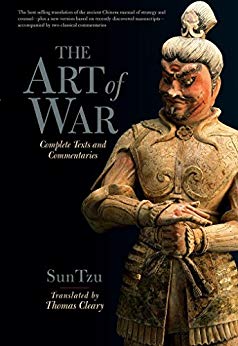

This article is an excerpt from the Shortform summary of "The Art of War" by Sun Tzu. Shortform has the world's best summaries of books you should be reading.
Like this article? Sign up for a free trial here .
What are some of the greatest quotes by Sun Tzu? Are they applicable today, outside the battlefield?
According to Sun Tzu, the key to winning the battle is to know your enemy. When you know your enemy, you can anticipate their actions beforehand. You can also determine whether you stand the chance of winning a battle and regroup accordingly.
Here are some of Sun Tzu’s enemy quotes with explanations.
Enemy Quotes by Sun Tzu
The Art of War by Sun Tzu was written as a strategic handbook for how to navigate military conflict. The principles and suggestions provided throughout the book are geared toward armed struggle and the relationships between governments and military factions. However, the teachings of this book are applicable to real-world scenarios, as well.
Here are Sun Tzu’s enemy quotes and the rationale behind them.
It is said that if you know your enemies and know yourself, you will not be imperiled in a hundred battles; if you do not know your enemies but do know yourself, you will win one and lose one; if you do not know your enemies nor yourself, you will be imperiled in every single battle.
Knowing the strength of your enemy is vital. Once you have fully assessed your opponent’s capabilities, you must understand how to use the information to bolster your position.
If the enemy is operating from a foundation of fullness, meaning all facets of the five traits are viable, you should keep a close eye on them and start organizing your forces. Ensure that your side is equally “fulfilled” and aware of possible conflict. Avoid conflict until your enemy’s situation changes.
- When your opponent sees that you mean not to engage in the conflict, a gap may open up. They may relax and provide an opportunity suitable for attack.
- Also, your lack of action may begin to anger the opposing leadership.
- Continue to find ways to anger and irritate your opponent, for decisions made out of anger are often petulant and rash, which can lead to advantages for you.
Once you notice that your opponent is riled up or angry, back off to give them the delusion of superiority or success. They may become arrogant or lax in their judgment, from which carelessness extends.
- If the enemy deems that you are no longer a threat, they will underestimate you or dismiss you as an opponent.
- This arrogance creates the perfect environment for you to successfully attack them.
When the enemy is relaxed, make them toil. When full, starve them. When settled, make them move.
In addition to manipulating a strong enemy into carelessness, forcing the enemy to exert energy will create opportunities of advantage for you.
Strategize your efforts so they are geared toward controlling your opponent’s momentum. These tactics include surprise attacks, retreating when they advance, advancing when they retreat, and maneuvering them in different directions.
For example, you might strike a certain portion of the enemy’s forces to push them down a particular path in defense. When their energy shifts to take up this defense, switch your assault to the enemy troops in the opposite direction. Switching attack positions forces your opponent’s defense to hustle down another path to defend against your advance.
Moving them back and forth by forcing them to react to conflict, rather than allowing them to initiate conflict, will keep them on their toes and tire them out.
“Appear weak when you are strong, and strong when you are weak.”
Appearing to be weak, unprepared, or small in size can lure your opponent into traps and make them susceptible to misguided actions or responses. For instance, creating a scenario where only a small portion of your force is visible can mislead opponents into thinking they outnumber or outarm you. When they prepare an attack under that guise, they will be ill-prepared for the full strength of your forces.
Another example is allowing your opponent to win small victories or gains. Your opponent may fall victim to greed or an inflated ego, which will confuse and hinder their strategy when the truth is revealed.
One need not destroy one’s enemy. One need only destroy his willingness to engage.
Victory is not just winning the battle. Destroying your opponent is not the most important thing. Destabilizing your opponent is. If the battle is won but the opponent’s forces and country are obliterated, that is a lesser victory than if you are able to overcome them and force a surrender.
- If you can weaken your opponent’s resolve and force them to concede with their nation intact, your victory is more successful.
- The people will have greater respect for a battle won with integrity than one won through total destruction.
———End of Preview———

Like what you just read? Read the rest of the world's best summary of "The Art of War" at Shortform . Learn the book's critical concepts in 20 minutes or less .
Here's what you'll find in our full The Art of War summary :
- How to mislead your enemies to win the war
- Classic examples from Chinese history to illustrate Sun Tzu's strategies
- How to use spies to gather information and defeat your opponents






